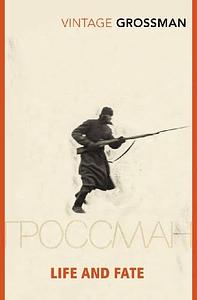Take a photo of a barcode or cover
challenging
dark
emotional
slow-paced
Strong character development:
No
Loveable characters:
Complicated
Diverse cast of characters:
No
Flaws of characters a main focus:
Complicated
It took me a year and a half but I finished it! As with any book with this large a cast of characters, you're not going to like them all, and I could not stand Victor, who is probably the one Grossman returns to the most, so that made this book more of a slog.
Na 350 pagina's geloofde ik het wel. Register met alle personages was zeker geen overbodige luxe
Grossman’s Life and Fate is an epic novel of Soviet society in World War II. It is the kind of book that keeps you awake very late, so late that you might hear the first birds waking up. It is a book where the deepest despair seems to smother last hopes – where occasional acts of “senseless kindness” are the only events that keep the candle of humanity, even if only tenuously, alight. These acts of “senseless kindness” are, in the scribblings of the mystic prisoner Ikonnikiv-Morzh, what sustain humanity amidst the flood of evil threatening to engulf us all. Life and Fate has made me more keenly aware than ever of the immensity of evil and how powerless it can make us feel. Ikonnikov’s speculations are fulfilled in the action of Khristya Chunyak when she helps the newly ‘liberated’ but exhausted prisoner Semyonov who has been turned away by others. Ikonnikov’s words seem like half-demented ramblings to some but they have the power to take us beyond the sectarian moral positions that dominate much of the novel and indeed continue to assert themselves in our real world outiside its pages. Through extraordinary set-pieces I followed this book to its conclusion. Maybe Grossman doesnt quite bring his characters to life as vividly as Tolstoy but as the novel moved towards its end I was conscious of a different kind of poetry in the long diminuendo that takes us through the working out of the sad incomplete destiny of Viktor the physicist. Even as it shows the possibility of survival this particular episode also demonstrates its human cost.
There is too much to say about this novel – it requires perhaps not one or two but even more readings to reveal its richness. I would make a plea for others to experience its depictions of suffering and stoicism. I know in myself only too well what it means to lack stoicism – even though my own difficulties are relatively slight and others would endure them with ease.
It is a panoramic canvas with many stories and struggles unfolding. The reader, while invited to share the narrator’s deep compassion for what befalls characters like Lyudmila as they experience a profound loss, is also looking on from a certain distance. The balance in the book is poised between the personal and the political and it is the latter that often seems to be the strongest presence. always making us stand back after being drawn in by individual fates.
I would like to leave this contemplation with a quote from Life and Fate in the English translation that gave some comfort to me
” Good men and bad men alike are capable of weakness. The difference is simply that a bad man will be proud all his life of one good deed – while an honest man is hardly aware of his good acts, but remembers a single sin for years on end.”
There is too much to say about this novel – it requires perhaps not one or two but even more readings to reveal its richness. I would make a plea for others to experience its depictions of suffering and stoicism. I know in myself only too well what it means to lack stoicism – even though my own difficulties are relatively slight and others would endure them with ease.
It is a panoramic canvas with many stories and struggles unfolding. The reader, while invited to share the narrator’s deep compassion for what befalls characters like Lyudmila as they experience a profound loss, is also looking on from a certain distance. The balance in the book is poised between the personal and the political and it is the latter that often seems to be the strongest presence. always making us stand back after being drawn in by individual fates.
I would like to leave this contemplation with a quote from Life and Fate in the English translation that gave some comfort to me
” Good men and bad men alike are capable of weakness. The difference is simply that a bad man will be proud all his life of one good deed – while an honest man is hardly aware of his good acts, but remembers a single sin for years on end.”
Resolute Reader review here:
http://resolutereader.blogspot.com/2009/11/vasily-grossman-life-and-fate.html
http://resolutereader.blogspot.com/2009/11/vasily-grossman-life-and-fate.html
From BBC Radio4 Extra:
Anna's Letter By Vasily Grossman Viktor's mother, Anna, writes him a farewell letter in September 1941. As a Jew in Berdichev, in the Ukraine now occupied by the Nazis, she has been forced into a ghetto and understands what will come next. The letter somehow finds its way to Viktor and is to be a source of strength for him in days to come.
Anna's Letter By Vasily Grossman Viktor's mother, Anna, writes him a farewell letter in September 1941. As a Jew in Berdichev, in the Ukraine now occupied by the Nazis, she has been forced into a ghetto and understands what will come next. The letter somehow finds its way to Viktor and is to be a source of strength for him in days to come.
What better way to mark the election of Donald Trump, than to re-read a novel about the clash of two of history's worst authoritarians? Lest we forget...
So many brilliant moments in this book--just wish I'd had more brain bandwidth to keep track of its many, many plotlines and characters.
So di rischiare il linciaggio. Ad essermi piaciuto indubbiamente mi è piaciuto. Ma capisco anche che qualcosa tra me ed il libro debba essere andato storto perché non riesco a dargli quel massimo dei voti che in pratica il mondo intero gli concede al grido del capolavoro assoluto.
L'immensa quantità di personaggi (mi sono dovuto scrivere un elenco, ho rischiato di impazzire!) ha fatto sì, secondo me, che non tutti fossero sempre ben sfaccettati, anzi, ho spesso avuto la sensazione di legarmi maggiormente a personaggi del tutto secondari, e con secondari intendo anche comparse, rispetto ad alcuni dei personaggi principali. In questo senso devo dire che la mia empatia nei confronti di Štrum è stata quasi inesistente ed il mio interesse nelle sorti della centrale elettrica e di Spiridinov praticamente nullo.
D'altro canto vi sono episodi che hanno brillato di luce propria e che mi hanno colpito in profondità. Il dialogo tra Mostovskoj e la SS Liss con il parallelo tra comunismo e nazismo come condanna del totalitarismo in quanto tale, la lettura da parte di Mostovskoj dei fogli di Ikonnikov, l'intera vicenda della Casa al 6/1, l'intera storia di Krymov alla Lubjanka, tutti i passi trattanti la disperazione sentimento che Grossman maneggia con un grazia unica, nonché l'immensa lotta tra il bene ed i piccoli atti di bontà che permea l'intero libro.
Laddove il bene genera la mostruosità, la bontà vive nei gesti.
Grossman mostra in particolare nell'ultima parte del testo come questi possano sorgere anche nel contesto più cruento e spaventoso, come quello della battaglia di Stalingrado e come la bontà possa farsi strade tra il sangue e le macerie.
Si vuole mostrare come sia dalla bontà che la civiltà debba rinascere dalle ceneri della distruzione che la ricerca del bene, dimostratosi quanto mai impossibile da essere inteso in maniera univoca, aveva portato.
Tutti questi spunti sono assolutamente al livello del termine capolavoro, ma ho trovato il testo veramente troppo discontinuo.
Il critico sovietico Vladimir Lashkin scrisse nel 1988 che "leggere Vita e Destino è come ascoltare l'eco di centinaia di conversazioni essendo al centro di una folla immensa". L'interpretazione che se ne può dare può essere senza dubbio positiva, tante voci possono portare doni preziosi, ma anche altrettanto negativa, ed io ho trovato sinceramente che alcune delle voci inserite da Grossman non avessero poi così tanto da dire contribuendo solo ad appesantire il romanzo.
Quattro stelle perché quando arriva in vetta tocca le cime più alte, non cinque perché alla cime più alte si sono, a parer mio, alternate delle vere e proprie steppe.
L'immensa quantità di personaggi (mi sono dovuto scrivere un elenco, ho rischiato di impazzire!) ha fatto sì, secondo me, che non tutti fossero sempre ben sfaccettati, anzi, ho spesso avuto la sensazione di legarmi maggiormente a personaggi del tutto secondari, e con secondari intendo anche comparse, rispetto ad alcuni dei personaggi principali. In questo senso devo dire che la mia empatia nei confronti di Štrum è stata quasi inesistente ed il mio interesse nelle sorti della centrale elettrica e di Spiridinov praticamente nullo.
D'altro canto vi sono episodi che hanno brillato di luce propria e che mi hanno colpito in profondità. Il dialogo tra Mostovskoj e la SS Liss con il parallelo tra comunismo e nazismo come condanna del totalitarismo in quanto tale, la lettura da parte di Mostovskoj dei fogli di Ikonnikov, l'intera vicenda della Casa al 6/1, l'intera storia di Krymov alla Lubjanka, tutti i passi trattanti la disperazione sentimento che Grossman maneggia con un grazia unica, nonché l'immensa lotta tra il bene ed i piccoli atti di bontà che permea l'intero libro.
Laddove il bene genera la mostruosità, la bontà vive nei gesti.
Grossman mostra in particolare nell'ultima parte del testo come questi possano sorgere anche nel contesto più cruento e spaventoso, come quello della battaglia di Stalingrado e come la bontà possa farsi strade tra il sangue e le macerie.
Si vuole mostrare come sia dalla bontà che la civiltà debba rinascere dalle ceneri della distruzione che la ricerca del bene, dimostratosi quanto mai impossibile da essere inteso in maniera univoca, aveva portato.
Tutti questi spunti sono assolutamente al livello del termine capolavoro, ma ho trovato il testo veramente troppo discontinuo.
Il critico sovietico Vladimir Lashkin scrisse nel 1988 che "leggere Vita e Destino è come ascoltare l'eco di centinaia di conversazioni essendo al centro di una folla immensa". L'interpretazione che se ne può dare può essere senza dubbio positiva, tante voci possono portare doni preziosi, ma anche altrettanto negativa, ed io ho trovato sinceramente che alcune delle voci inserite da Grossman non avessero poi così tanto da dire contribuendo solo ad appesantire il romanzo.
Quattro stelle perché quando arriva in vetta tocca le cime più alte, non cinque perché alla cime più alte si sono, a parer mio, alternate delle vere e proprie steppe.
This is a huge sprawling novel, centred around the battle of Stalingrad, but weaving in and out and incorporating the Holocaust, the Soviet detention centres, Soviet science under Stalin, life at the front, life at home, and the nature of freedom and humanity. (And I found Grossman's musings on the latter two more readable than Tolstoy's long philosophical digressions, to be perfectly honest.)
Note: The rest of this review has been withdrawn due to the recent changes in Goodreads policy and enforcement. You can read why I came to this decision here.
In the meantime, you can read the entire review at Smorgasbook
Note: The rest of this review has been withdrawn due to the recent changes in Goodreads policy and enforcement. You can read why I came to this decision here.
In the meantime, you can read the entire review at Smorgasbook



